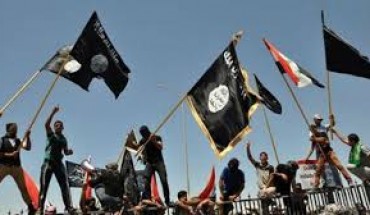The Islamic State terror group claimed that it had seized control of the city of Ramadi Sunday in what would be the biggest loss for Iraqi forces since the beginning of U.S. airstrikes targeting extremists this past September.
The Associated Press reported that Iraqi forces had dropped their weapons and fled their positions in an apparent reprise of the fall of Mosul, which catapulted the group commonly known as ISIS into the international spotlight last summer.
Bodies, some burned, littered the streets as local officials reported the militants carried out mass killings of Iraqi security forces and civilians. Online video showed Humvees, trucks and other equipment speeding out of Ramadi, with soldiers gripping onto their sides.
A Sunni tribal leader, Naeem al-Gauoud, said many tribal fighters died trying to defend the city and their bodies were strewn in the streets, while others had been thrown in the Euphrates River. Ramadi mayor Dalaf al-Kubaisi said that more than 250 civilians and security forces were killed over the past two days, including dozens of police and other government supporters shot dead in the streets or their homes, along with their wives, children and other family members.
Muhannad Haimour, a spokesman for the provincial governor of Anbar, said Monday that around 500 civilians and Iraqi soldiers are estimated to have been killed over the last few days, while approximately 8,000 had fled the city. He said the figure is in addition to the enormous exodus in April, when the U.N. said as many as 114,000 residents fled from Ramadi and surrounding villages at the height of the violence.
“Ramadi has fallen,” Haimour had told AP Sunday. “The city was completely taken. … The military is fleeing.”
“Ramadi has been contested since last summer and ISIL now has the advantage,” Navy Commander Elissa Smith, using another acronym for ISIS, said late Sunday. “We have always known the fight would be long and difficult, particularly in Anbar [province].”
Smith said that the U.S. would continue to support Iraqi forces with airstrikes and added, “The loss of Ramadi does not mean the tide of the campaign has turned, and we have long said that there would be ebbs and flows on the battlefield. If lost, that just means the coalition will have to support Iraqi forces to take it back later.”
Secretary of State John Kerry, speaking in South Korea, called Ramadi a “target of opportunity” for extremists, but said he was confident that ISIS’ gains could be reversed in the coming days. Kerry also said that he’s long said the fight against the militant group would be a long one, and that it would be tough in the Anbar province of western Iraq where Iraqi security forces are not built up.
The U.S.-led coalition said Sunday it had conducted seven airstrikes in Ramadi in the last 24 hours. “It is a fluid and contested battlefield,” said Army Col. Steve Warren, a Pentagon spokesman. “We are supporting (the Iraqis) with air power.”
Iraqi Prime Minister Haider al-Abadi ordered security forces not to abandon their posts across Anbar province, apparently fearing the extremists could capture the entirety of the vast Sunni province that saw intense fighting after the 2003 U.S.-led invasion of the country to topple dictator Saddam Hussein.
Sunday’s retreat recalled the collapse of Iraqi security forces last summer in the face of the Islamic State group’s blitz into Iraq that saw it capture a third of the country, where it has declared a caliphate, or Islamic State. It also calls into question the Obama administration’s hopes of relying solely on airstrikes to support the Iraqi forces in expelling the extremists.
Al-Abadi also ordered Shiite militias to prepare to go into the Sunni-dominated province, ignoring U.S. concerns their presence could spark sectarian bloodshed. By late Sunday, a large number of Shiite militiamen had arrived at a military base near Ramadi, apparently to participate in a possible counter-offensive, said the head of the Anbar provincial council, Sabah Karhout.
Youssef al-Kilabi, a spokesman for the Shiite militias fighting alongside Prime Minister Haider al-Abadi’s forces, told The Associated Press on Monday that the paramilitary forces have drawn up plans for a Ramadi offensive in cooperation with the government security forces and vowed to dislodge IS from Ramadi.
We will “eliminate this barbaric enemy,” al-Kilabi said. “God willing, we will achieve this triumph and we will not accept anything less than that.”
He did not elaborate on the plans or the timing of a counter-offensive.
“We welcome any group, including Shiite militias, to come and help us in liberating the city from the militants,” al-Gauoud, the Sunni tribal leader, told AP. “What happened [Sunday] is a big loss caused by lack of good planning by the military.”
The final push by the extremists began early Sunday with four nearly simultaneous bombings that targeted police officers defending the Malaab district in southern Ramadi, a pocket of the city still under Iraqi government control, killing at least 10 police and wounding 15, authorities said. Among the dead was Col. Muthana al-Jabri, the chief of the Malaab police station, they said.
Later, three suicide bombers drove their explosive-laden cars into the gate of the Anbar Operation Command, the military headquarters for the province, killing at least five soldiers and wounding 12, authorities said.
Fierce clashes erupted between security forces and ISIS militants following the attacks, and the extremists later seized Malaab after government forces withdrew, with the militants saying they controlled the military headquarters.
A police officer who was stationed at the headquarters said retreating Iraqi forces left behind about 30 army vehicles and weapons that included artillery and assault rifles. He said some two dozen police officers disappeared during the fighting.
The officer and other officials spoke on condition of anonymity as they weren’t authorized to talk to journalists.
On a militant website frequented by ISIS members, a message from the group claimed its fighters held the 8th Brigade army base, as well as tanks and missile launchers left behind by fleeing soldiers. The message could not be independently verified by the AP, but it was similar to others released by the group and was spread online by known supporters of the extremists.
Last week, the militants swept through Ramadi, seizing the main government headquarters and other key parts of the city. It marked a major setback for the Iraqi government’s efforts to drive the militants out of areas they seized last year. Previous estimates suggested ISIS held at least 65 percent of Anbar.
Backed by the U.S.-led airstrikes, Iraqi forces and Kurdish fighters have made gains against ISIS, including capturing the northern city of Tikrit. But progress has been slow in Anbar, a Sunni province where anger at the Shiite-led government runs deep and where U.S. forces struggled for years to beat back a potent insurgency. American soldiers fought some of their bloodiest battles since Vietnam on the streets of Ramadi and Fallujah.
U.S. troops were able to improve security in the province starting in 2006 when powerful tribes and former militants allied with American forces and turned against Al Qaeda in Iraq, a precursor to ISIS.
But the so-called Sunni Awakening movement waned in the years after U.S. troops withdrew at the end of 2011, with the fighters complaining of neglect and distrust from the Shiite-led government in Baghdad.
The Associated Press contributed to this report.

